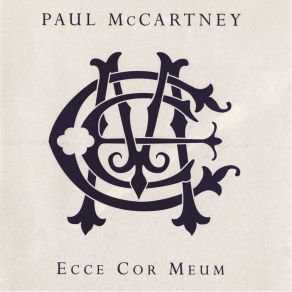McCartney: Ecce Cor Meum
Download links and information about McCartney: Ecce Cor Meum by Gavin Greenaway, The Academy Of St. Martin In The Fields. This album was released in 2006 and it belongs to genres. It contains 5 tracks with total duration of 56:49 minutes.

|
|
|---|---|
| Artist: | Gavin Greenaway, The Academy Of St. Martin In The Fields |
| Release date: | 2006 |
| Genre: | |
| Tracks: | 5 |
| Duration: | 56:49 |
| Buy it NOW at: | |
| Buy on iTunes $11.99 | |
Tracks
[Edit]| No. | Title | Length |
|---|---|---|
| 1. | Ecce Cor Meum, Movement I. Spiritus (featuring Academy Of St Martin-In-The-Fields Chorus) | 12:00 |
| 2. | Ecce Cor Meum, Movement II. Gratia (featuring Academy Of St Martin-In-The-Fields Chorus) | 10:50 |
| 3. | Ecce Cor Meum, Interlude (Lament) (featuring Academy Of St Martin-In-The-Fields Chorus) | 3:56 |
| 4. | Ecce Cor Meum, Movement III. Musica (featuring Academy Of St Martin-In-The-Fields Chorus) | 15:14 |
| 5. | Ecce Cor Meum, Movement IV. Ecce Cor Meum (featuring Academy Of St Martin-In-The-Fields Chorus) | 14:49 |
Details
[Edit]Ecce Cor Meum ("Behold My Heart" in Latin) is Paul McCartney's fourth album of classical music and his second oratorio, following Liverpool Oratorio of 1991. Like that piece, it was commissioned, in this case by Anthony Smith, then president of Magdalen College at Oxford University, who was looking for a work to christen a new concert hall. As so often happens with commissions, the composition took much longer than intended, eight years, in fact, with work interrupted for other projects and by McCartney's tumultuous personal life, which included the death of his first wife, Linda McCartney, and his meeting, marrying, and separating from his second. According to producer John Fraser, as quoted by annotator Peter Quantrill, it was the earlier event that most affected the work: "The loss of Linda is suffused throughout the piece." If so, that would explain some of the more melancholy passages, notably the brief Interlude (Lament) that comes in the middle of the work. Death also is apparent in the final section, Ecce Cor Meum itself, which contains lyrics commenting on separation. But McCartney's sunnier nature is also apparent throughout. The hourlong choral work sounds appropriate to its commission; it would fit in well in either a concert hall or church, sung by an adult and boys' choir. Most of McCartney's lyrics are generalized expressions of love and, as the opening section puts it, Spiritus, rather than God specifically. There are moments that pop fans will recognize, certain familiar melodic motifs and instrumental sounds. For example, McCartney's affection for the piccolo trumpet, first revealed on "Penny Lane," is explored further. Ecce Cor Meum is not a great new choral work. It is unlikely, as Smith hoped, to be "sung by young people the world over in the same way that Handel's Messiah is." But on its own terms, it is a successful minor piece of classical music.